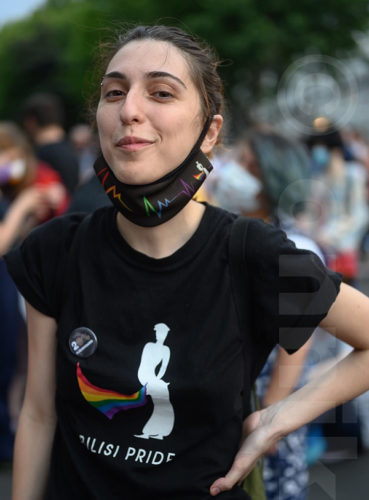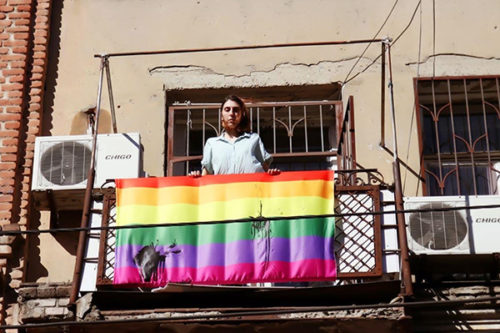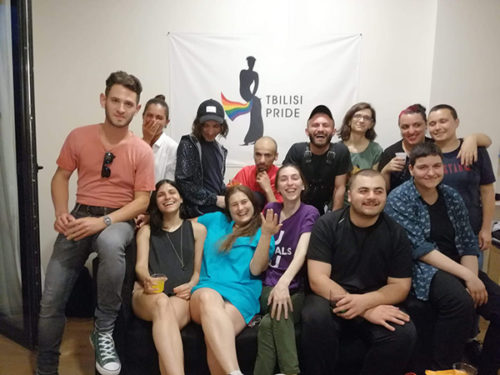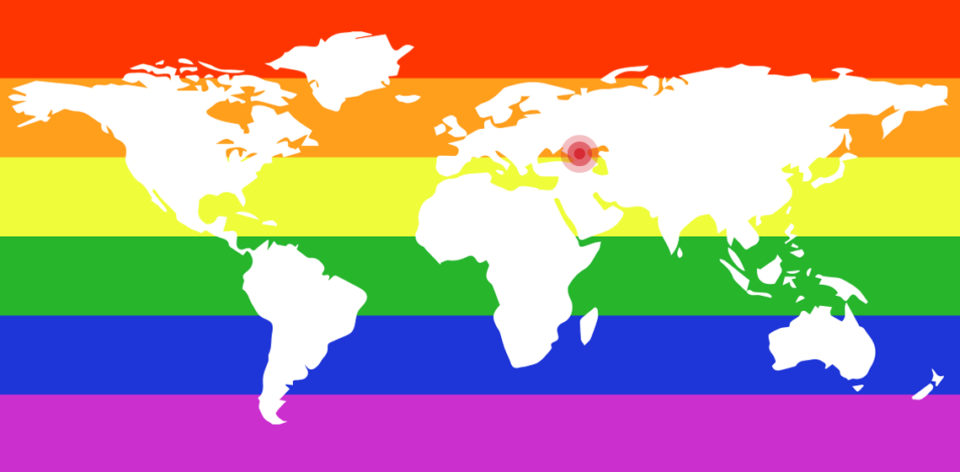In the August heat, all we want to do is find a place to cool down, either by dipping ourselves in the sea or by climbing high to the mountains. With the monthly interview, we are inviting you to a place where both are possible: whether you prefer bathing in the Black Sea or hiking in the Caucasus, Georgia is the place for you. Mariami will tell us about how life is on the border between Europe and Asia.
Can you introduce yourself please?
I'm Mariami Kvaratskhelia from Georgia. I'm a bisexual woman and an LGBTQI activist. I've been actively fighting for LGBTQI equality since 2015 in different roles. I've worked as a legal and advocacy officer at several NGOs, managed various projects and campaigns, and most importantly I've co-founded the first ever Tbilisi Pride initiative, in 2019. Currently, my main responsibility at Tbilisi Pride is to advocate for relevant legislative or policy reforms with the government and with political parties in order to reduce homo/transphobia, changing the lives of LGBTQI people in Georgia for the better.

What’s the situation of the LGBTQ+ community in Georgia?
Georgia is a very conservative country, with the majority of its people practicing Orthodox Christianity. Georgian people consider that being 'gay' or fighting for LGBTQ+ rights is against Georgian religion, culture, and traditions. Nevertheless, we've had some positive developments during the last 10-15 years. The state has put important efforts in “protection” of LGBTQ+ people by forbidding discrimination and violence on the grounds of sexual orientation and gender identity, adopting anti-discrimination laws in 2014. Then, this year, for the first time in my country’s history, LGBT issues were covered in the National Human Rights Action Plan.
But Georgia is far from treating LGBTQ+ people equally; therefore, the rights of same-sex marriage, civil partnership, adoption, and legal gender recognition are not yet granted. Even though Georgia has some pieces of progressive legislation and policies, the everyday lives of LGBTQ+ people remain extremely difficult. Queer people are often victims of discrimination and verbal-physical violence including domestic violence. Most of the LGBTQ+ people are not out with their families and co-workers, remaining closeted for their entire life. According to the last poll, 80% of Georgians say that they wouldn't like to have an LGBTQ+ person as a neighbor. Up until this moment, LGBTQ+ people are not able to organize marches (such as the Pride). Both the Georgian Orthodox Church and far-right groups openly and directly oppose LGBTQ+ people exercising their constitutional rights of peaceful assembly and the freedom of expression. The Georgian government is following the directives of the Orthodox church, tolerating hate crimes committed by the leaders of far-right radical groups.

Can you say a couple of words about LBTQ women in particular?
LBTQ women are the victims of double oppression in Georgia. Gender inequality is huge in the country. We have extremely high rates of femicide and domestic violence. Women's lives, sexuality, behaviors are strictly controlled by their families and patriarchal society. Therefore, being a lesbian in Georgia means being twice oppressed. Masculine lesbians are often the victims of verbal attacks and sometimes even physical attacks in public spaces. Young queer women are often locked in the houses, having their communications restricted if and when their sexuality are revealed to their families. There have been various cases when lesbians were threatened with taking away their parenting rights because of their sexuality or for choosing to live with their female partner.
Nevertheless, there are 2-3 LBTQ organizations/initiatives such as WISG, Lesbian Resistance and Identoba+ that actively try to empower lesbians by offering various services such as free legal, social, and psychological aid, and most importantly by running community centers that are safe spaces for LBTQ women to meet and organize.

Finally, can you share a funny, memorable, or inspirational coming out story of yours?
Coming out can be a never ending process and we queer people know this best. Personally, I have come out so many times with so many different people that I cannot even keep track. The most recent coming out was in June, 2020, when I was holding an LGBT sensitization training for public school teachers with homophobic attitudes. I talked about many different topics during the 3-hour-training such as Gender and Sexuality, the history of LGBTQ+ activism over the world, and the situation of LGBTQ+ people in Georgia. At the end of the meeting, I touched on the coming out phenomenon, and in this moment I felt like I needed to come out and briefly talk about my experiences. It was quite a big risk to take but I decided to do so. I came out to the group of 25 teachers as a woman who loves women and talked about my coming out experiences with my family members, colleagues, etc. There was a big silence for several minutes so I could feel how shocked the audience was. But after a while, they started to talk and provide feedback which was really positive. I believe that my coming out had an important impact on these people, and generally I believe that each and every coming out is changing the lives of queer people for the better.

